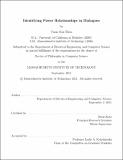Identifying power relationships in dialogues
Author(s)
Shen, Yuan Kui
DownloadFull printable version (3.329Mb)
Other Contributors
Massachusetts Institute of Technology. Dept. of Electrical Engineering and Computer Science.
Advisor
Boris Katz.
Terms of use
Metadata
Show full item recordAbstract
Understanding power relationships is an important step towards building computers that can understand human social relationships. Power relationships can arise due to dierences in the roles of the speakers, as between bosses and employees. Power can also affect the manner of communication between social equals, as between friends or acquaintances. There are numerous potential uses for an automatic system that can understand power relationships. These include: the analysis of the organizational structure of formal and ad-hoc groups, the profiling of in influential individuals within a group, or identifying aggressive or power-inappropriate language in email or other Internet media. In this thesis, we explore the problem of engineering eective power identication systems. We show methods for constructing an eective ground truth corpus for analyzing power. We focus on three areas of modeling that help in improving the prediction of power relationships. 1) Utterance Level Language Cues - patterns of language use can help distinguish the speech of leaders or followers. We show a set of eective syntactic/semantic features that best capture these linguistic manifestations of power. 2) Dialog Level Interactions - the manner of interaction between speakers can inform us about the underlying power dynamics. We use Hidden Markov Models to organize and model the information from these interaction-based cues. 3) Social conventions - speaker behavior is in influenced by their background knowledge, in particular, conventional rules of communication. We use a generative hierarchical Bayesian framework to model dialogs as mental processes; then we extend these models to include components that encode basic social conventions such as politeness. We apply our integrated system, PRISM, on the Nixon Watergate Transcripts, to demonstrate that our system can perform robustly on real world data.
Description
Thesis (Ph. D.)--Massachusetts Institute of Technology, Dept. of Electrical Engineering and Computer Science, 2011. This electronic version was submitted by the student author. The certified thesis is available in the Institute Archives and Special Collections. Cataloged from student submitted PDF version of thesis. Includes bibliographical references (p. 175-179).
Date issued
2011Department
Massachusetts Institute of Technology. Department of Electrical Engineering and Computer SciencePublisher
Massachusetts Institute of Technology
Keywords
Electrical Engineering and Computer Science.